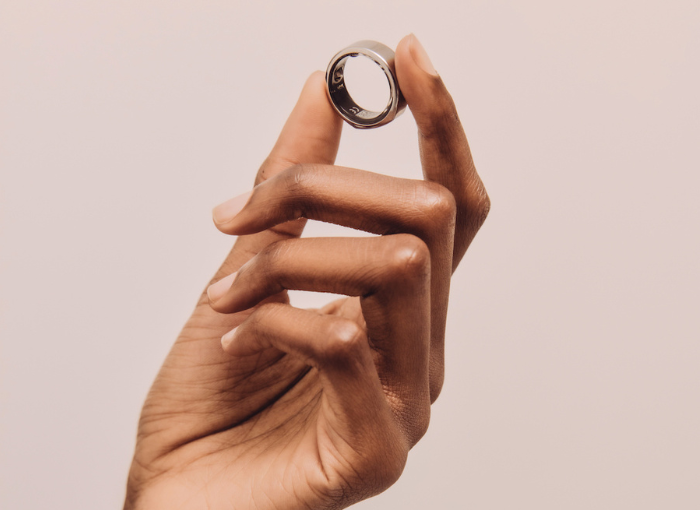The Oura Ring is a wearable health device that is included in your treatment. Using valuable insights from key metrics like heart rate variability, body temperature, and sleep patterns, the ring helps us paint a comprehensive picture of your health. Think of the Oura Ring as a continuous health conversation. It doesn't just collect data—it tells a story about your body's rhythms, responses, and resilience.
We use Oura data to personalize your care plan, helping you recognize patterns that may be affecting your symptoms and overall well-being. Our health coaches will review your sleep quality, recovery trends, and stress responses to guide adjustments in your routine—whether that means refining your sleep schedule, optimizing movement, or improving relaxation techniques.
With real-time feedback, we can track how different strategies impact your health and adjust your plan accordingly, ensuring you get the most out of your treatment.
Jump to a section:
How the Oura Ring supports your treatment
Our approach is collaborative. The data from your Oura Ring allows our health coaches to:
- Identify subtle patterns that might be influencing your symptoms
- Personalize your treatment plan with precision
- Track how lifestyle changes impact your overall well-being
- Provide real-time, data-driven recommendations
Oura and Sleep
Quality sleep is essential for managing autoimmune conditions and reducing inflammation. The Oura Ring tracks your total sleep time, sleep stages (light, deep, and REM), and overall sleep efficiency, giving you a Sleep Score that reflects how restorative your sleep was.
Your daily sleep scores may help you determine your unique sleep patterns and when to start winding down before bed, the best times of day to get in physical activity, and how a hot bath or late-night caffeine or glass of wine might impact your sleep quantity and quality.

Sleep stages
Every night, your brain and body experience different phases of sleep that each play an essential role in maintaining your mental and physical health. You can get a summary of each night’s sleep stages in the Oura app.

1. Awake Time
It’s normal to wake up sometimes during the night and you may not always be conscious of being awakened. If you often feel fatigued throughout the day, that may be a sign to pay more attention to your awake time during the night.
2. Light Sleep
The light sleep stage is key to delivering benefits to your brain and body, including codifying memories and boosting creativity. About half of your time spent asleep is in the light sleep stage.
During light sleep, your muscles relax (and may jerk), respiration and heart rate slow down, and your body temperature drops.
3. Deep Sleep
This is your body's restoration period. During this critical phase:
- Physical recovery and healing are at their peak
- Muscle tissue regenerates
- The immune system strengthens
- Growth hormone is released
- Energy is replenished
Typical adults need 1-2 hours of deep sleep per night. Less deep sleep can result in: Feeling less physically restored, decreased physical performance, and potential impacts on metabolism and healing.
4. REM Sleep
Rapid Eye Movement (REM) sleep is your brain's processing and consolidation time. It’s most important for your mental well-being. This is also the phase where a majority of your vivid dreaming occurs. This phase is critical for:
- Cognitive function
- Emotional regulation
- Memory consolidation and learning
- Supporting creativity and problem-solving
Typical adults need about 1.5-2 hours of REM sleep nightly. Insufficient REM sleep might lead to mood and emotional disturbances, challenges with memory and learning, and decreased cognitive performance.
Your "Chronotype"
Your chronotype is another way of saying whether you’re a morning person, a night person, or somewhere in between. It’s strongly determined by your genetic makeup, and reflects your individual 24-hour rhythm.
It can be helpful to understand your your body's natural sleep and awake cycle to better align your routines. For example, people with evening chronotypes may benefit from morning workouts to help keep their energy up during the day.

With this sleep data, your health coach can help you:
✅ Improve sleep consistency by adjusting your bedtime routine
✅ Recognize habits that disrupt sleep, like late-night screen time or irregular meal patterns
✅ Implement strategies to improve deep and REM sleep, which are crucial for recovery
✅ Better align your lifestyle with your body's natural sleep and awake cycle (chronotype)
Heart Rate Variability (HRV)
Heart rate variability (HRV) measures the variation in time between your heartbeats. HRV indicates how well the body is responding to physiological stress, managing recovery, and maintaining overall health.
As a general rule:
- Higher HRV is associated with general fitness, and good physical recovery
- Lower HRV is associated with fight-or-flight responses, stress, illness, or physically overtraining
Some factors that affect your HRV are out of your control. They include things like age, genetics, hormone cycles, emotions, and illness. However, there are also some factors that you can control and can impact your HRV. Those include environmental factors like temperature and altitude, medication and substance use, physical activity, and sleep quality.
HRV is unique to each individual, so it is important to remember that you shouldn’t compare your scores to anyone other than yourself. What matters most is tracking your personal trends and using it to better understand your body’s patterns.

You can find your average HRV in the Sleep section of your Oura app.
Your Readiness Score
Your Readiness Score in the Oura app combines data on sleep, heart rate variability, and body temperature to assess how well your body has recovered and how prepared it is for the day ahead.
Readiness scores range from 1-100. A high Readiness Score suggests your body is primed for activity, while a lower score signals that it might be time to prioritize rest and recovery. A score of 85 or higher is optimal.

Your Resilience Score
While your readiness score measures how prepared your body is for the current day, your Resilience score reflects your body's ability to manage and recover from physiological stress over time.
Oura determines your resilience to stress by looking at how well you're balancing stress and recovery in recent weeks using your Daytime Stress levels, daily restorative time, and how well you recover during sleep.
Your resilience score will fall into one of five categories: Exceptional, Strong, Solid, Adequate, or Limited. If you notice your resilience score decreasing over time, you and your health coach may want to look into how your body is responding to stress and identify areas for improvement in your lifestyle and recovery habits.

You can access your Resilience Score and additional information about your score in the Oura app, by going to the "My Health" tab at the bottom and then clicking into the section titled "Resilience".
Stress
Stress can have a major impact on inflammation and autoimmune symptoms. The Oura Ring monitors your stress levels by analyzing heart rate variability and body temperature, offering insights into how your body responds to daily challenges.
Stress is any force that disrupts balance in your biometric data. This disruption can come from multiple sources, which Oura groups together to show you overall stress levels:
- Emotional challenges (work pressure, relationship difficulties)
- Physical demands (intense exercise, illness)
- Environmental factors (lack of sleep, dehydration)
- Psychological experiences (anxiety, excitement)

However, it’s important to keep in mind that not all stress is harmful. Stress can be viewed as an adaptive response that helps your body grow and respond to challenges. It can also be triggered by excitement, exercise, or socialization.
The ultimate goal isn't to eliminate stress entirely. Instead, focus on developing a deeper awareness of your body's stress responses and use the data to identify patterns, recognize triggers, and understand how different activities impact your overall well-being.
With this data, your health coach can help you:
✅ Identify stress triggers and patterns that may worsen symptoms
✅ Incorporate effective relaxation techniques to calm your nervous system
✅ Develop a personalized routine that supports better stress management
Movement and Activity
Regular movement is key to reducing stiffness, improving circulation, and managing inflammation. The Oura Ring tracks daily activity, step count, and exercise intensity, offering insights into how much—and what type—of movement best supports your health.

You can find this information in the Activity section of your Oura app.
With this data, your health coach can help you:
✅ Set realistic activity goals that make you feel your best
✅ Balance movement and rest to prevent overexertion during flare-ups
✅ Identify the types of physical activity that provide the most benefit without increasing inflammation
Making Connections
Using the tagging feature to make it easier to identify how daily behaviors impact different aspects of your health.
Think of tagging like adding sticky notes to your health data. When you experience something notable or do something specific, you can "tag" that moment in the Oura app. These tags create meaningful annotations to your health metrics, allowing you to understand the "why" behind your body's changes.
Here are some examples of tags you can use in the Oura app:
- Workouts
- Activity like walking or cycling
- Caffeine intake
- Alcohol consumption
- Stress and mood
- Menstruation
Tips for Getting Started
- Wear the ring consistently, preferably on your index or middle finger for the most accuracy.
- Charge your ring regularly. The Oura app will tell you how much battery power your ring has remaining.
- Make sure to open your Oura app once a day to have your data synced and shared with your care team.
- Be curious and observant about your personal health patterns.
- Remember, this journey is about progress, not perfection. Each data point is a piece of valuable information that helps us support your unique path to health.
Technical support for your Oura RingIf you have questions about interpreting your Oura data or how it can be used to optimize your treatment, your health coach or care team is here to help.
For technical support—such as troubleshooting device issues, battery problems, or technical glitches—reach out directly to Oura’s customer support.
|

-1.jpg)
